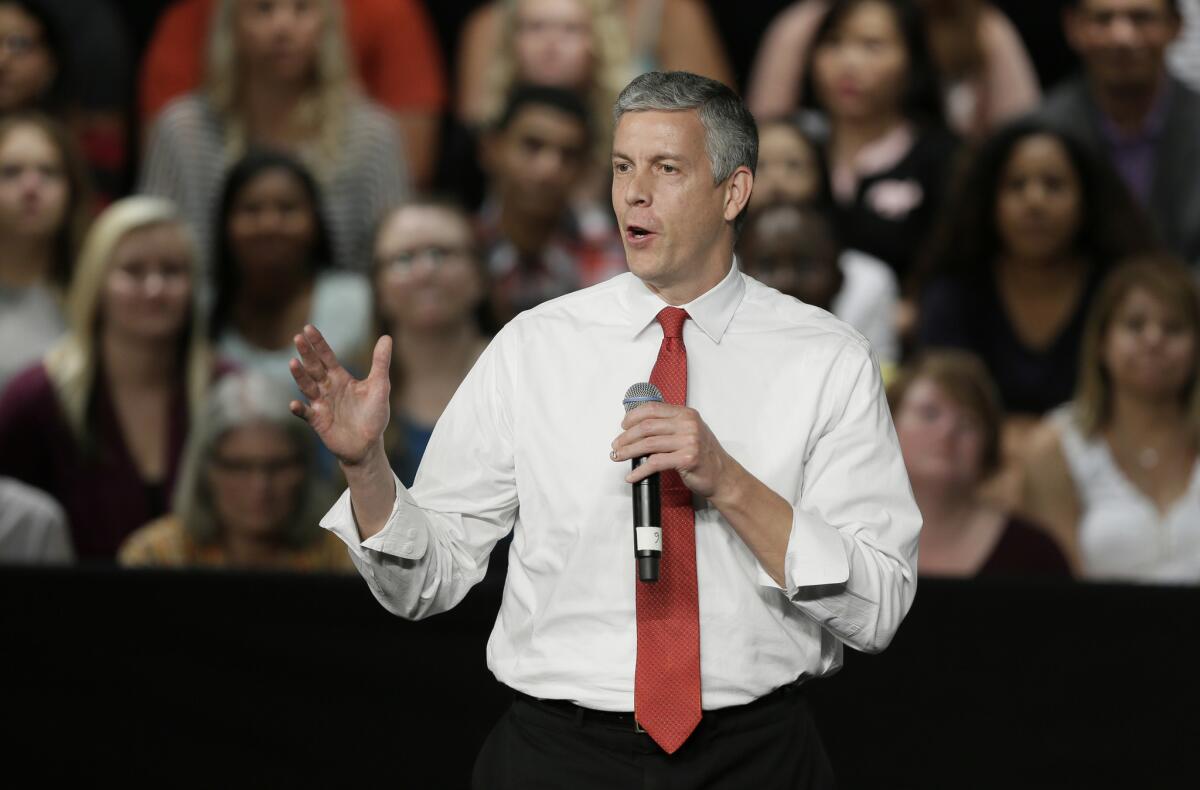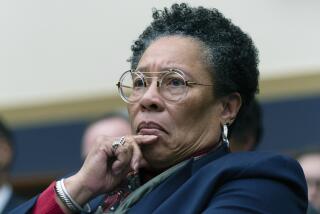Education Secretary Arne Duncan will step down in December

Education Secretary Arne Duncan speaks during a town hall meeting on Sept. 14 at North High School in Des Moines.
Secretary of Education Arne Duncan, who dramatically changed education policy in schools and colleges across the nation, is resigning in December.
Duncan, an original member of the Obama Cabinet, influenced a wide range of programs from preschool to PhD programs. His emphasis on standardized testing in K-12 education proved divisive from the left and the right. And he angered teachers unions with proposals to change the way instructors are evaluated, among other things. He pushed to expand federal financial aid for low-income college students and his department cracked down on for-profit colleges taking large amounts of federal funding but graduating few students.
The news was first reported by the Associated Press on Friday morning. Sources from the U.S. Education Department were not immediately available for comment, but a Los Angeles Times source close to the department who spoke on the condition of anonymity confirmed the development.
On Friday afternoon, Obama officially announced at a White House press conference that Duncan is stepping down. “I’ll be honest, I pushed Arne to stay, but I also know ... how hard it is to be away from your family,” Obama said. Deputy Secretary of Education John King, the former schools chief of New York state, will replace Duncan.
See the most-read stories this hour >>
Duncan’s departure leaves Tom Vilsack as the last original Cabinet member left in office. Duncan was previously CEO of Chicago Public Schools.
Duncan wrote in his resignation letter that his last few months of commuting to see his family in Chicago have been trying. His children had lived in Washington, D.C., and attended public schools in Virginia, but as of this year, they were back in Chicago — his wife, Karen, is working at the University of Chicago Laboratory Schools. (His children’s planned enrollment at a private school generated headlines in July).
“Serving the President in the work of expanding opportunity for students throughout this country has been the greatest honor of my life,” Duncan wrote in his resignation note to his staff.
“Doing so alongside people of the brilliance, ability and moral conviction of the team here at ED has been nothing short of thrilling. We have been lucky to have an a amazing team here from Day One, but I honestly believe our team today is the strongest it’s ever been.”
Duncan used his note to reassure his department that they “are in good hands” under King.
Duncan ended his note with a shoutout to two students he met in his travels. One is Brandon, a kid he met at a roundtable discussion in Denver who had “scrawled graffiti in a bathroom stall when he was 11 years old.” His school’s zero-tolerance discipline policies result in his “being sentenced to pick up trash along the highway alongside adult criminals.” Duncan wrote that Brandon “will always be a reminder of the distance we have to go as adults, to do right by our young people.”
Duncan’s tenure was underscored by his embrace of an agenda that reflected the priorities of what’s become known as the education reform movement: support of charter schools, a willingness to spar with teachers’ unions, and a push for more rigorous teacher evaluations that take students’ standardized test scores into account.
Duncan is also known for the Race to the Top competition, a signature funding competition that used stimulus money to create incentives for states to adopt some of those policies, including common standards. Duncan also became an outspoken supporter of increasing the capacity of early education programs. This week, he made headlines by proposing to decrease incarceration for nonviolent crimes and use that money to increase teacher pay.
From a policy level, Duncan was one of Obama’s major players who tried to work through executive power in moments of congressional gridlock. In light of Congress’ failure -- before this year -- to revise the No Child Left Behind Act, he offered states waivers to get out of the law’s most stringent restrictions in exchange for signing onto some Obama-preferred education policies. Most states took him up on it, including a group of school districts in California that jointly applied for a recently renewed waiver.
Duncan’s team also broke news by stepping up its civil rights investigations at universities where sexual assaults had allegedly taken place. For the first time, the Education Department’s Office of Civil Rights has made public the list of universities under investigation.
SIGN UP for the free Essential Politics newsletter >>
Duncan also became known for his relative forthrightness: He announced his support for same-sex marriage before Obama did, and got into trouble by saying that the Common Core is controversial because “white suburban moms” are too scared of test scores that would tell them how smart their kids really are, or are not.
Throughout his tenure, Duncan has faced immense pushback from critics in both parties: Republicans who think his administration has exerted too much control over the nation’s public schools, and Democrats who fundamentally disagree with the principles of education reform. He has also been on the receiving end of ire from teachers and their unions: In 2014, members of the National Education Assn. adopted a business item calling for his resignation. While Duncan has had moments of agreement both inside and outside of the party, he has been in constant tension with the presidents of the nation’s largest teachers’ unions over education policy.
The union presidents’ parting words for Duncan reflect their sometimes stormy relationships with him.
“NEA and Secretary Duncan have always been in clear agreement with the secretary that we need to strengthen public education and make sure all students have the opportunity to succeed,” said NEA president Lily Eskelsen Garcia. “We’ve also had our disagreements. There is a lot to be done to ensure the success of all our students, including fixing over-testing and making sure every child in every ZIP code has a quality education.”
Randi Weingarten, president of the American Federation of Teachers, said in a statement that she wishes Duncan “only the best.” She said she is grateful for the stimulus money Duncan got for schools, and acknowledged Duncan’s efforts to alleviate student debt, regulate for-profit colleges, boost early education and help low-income children. But, she added, “there’s no question that the Department of Education’s fixation on charters and high-stakes testing has not worked.”
Weingarten added that she is “disappointed to hear” about King’s appointment because his tenure in New York “created so much polarization in the state.”
At the press conference, Obama praised Duncan’s record on early childhood education, learning standards, graduation rates and college affordability. “Arne’s done more to bring our educational system — sometimes kicking and screaming — into the 21st century more than anyone else,” Obama said. “None of this change has been easy, and we still have a long way to go.”
As Duncan took to the podium, he said he had already cried a lot on Friday, and would try not to do so during his remarks. He said he agreed to take the Cabinet-level job because he knew Obama well, and “just wanted to be on his team.” Duncan cried a bit as he talked about his mother’s after-school program in Chicago, and how the Education secretary position helped him to continue her work. He said he looks forward to returning to Chicago, attending his kids’ track meets, and sitting down to dinner and movies with his family.
He introduced King, who is black, as “one of those kids that probably shouldn’t be in a room like this,” according to stereotypes, referring to the low representation of minorities in leadership positions.
King credited the public school teachers of New York City for keeping him alive, but gave few specifics for his plans as secretary of Education.
Justin Hamilton, Duncan’s former press secretary, was not surprised by Duncan’s resignation. “Arne’s number one rule was get me home for dinner,” he told The Times. “We could pack his schedule with as many things as we could fit in it and send him all over the country but at the end of the day he would be at home for his kids. Having to commute to Chicago to see your kids … has to be incredibly hard.”
Hamilton speculated that the changing politics in Congress could have contributed to his departure. Two major pieces of schools-related legislation are due for an overhaul: the Higher Education Act and the Elementary and Secondary Education Act, which is known as No Child Left Behind. The House and Senate have passed different versions of the bill, both of which dial back the federal government’s role in education, but to different degrees. A conference committee is working on reconciling the bills, but House Speaker John Boehner’s (R-Ohio) recent announcement that he is resigning is likely to change the politics around that process.
“Boehner was a dealmaker,” Hamilton said. “The idea that we’re going to wrestle the last two of the remaining white whales on the agenda … went from low probability to a snowball’s chance in hell.”
Sen. Lamar Alexander (R-Tenn.) is crucial in the process of rewriting No Child Left Behind as the chair of the Senate Health, Labor, Education and Pensions committee. A former U.S. secretary of Education himself, Alexander issued a statement Friday commending Duncan for his service.
“Arne Duncan was one of the president’s best appointments. He has a big heart, cares about children, and I have enjoyed working with him,” he said. “When we disagree, it is usually because he believes the path to effective teaching, higher standards and real accountability is through Washington, D.C., and I believe it should be in the hands of states, communities, parents and classroom teachers.”
In 2008, the group Democrats for Education Reform -- the proponents of the education reform movement within the Democratic Party -- strongly supported Duncan as a potential secretary of Education. On Friday, the group’s newly appointed president, Shavar Jeffries, praised Duncan for being the Education secretary with the most impact.
“Secretary Duncan has shown an unwavering willingness stand up to special interests, both those within and outside the Democratic Party, in order to do what is right,” Jeffries said in a statement.
You can reach Joy Resmovits on Twitter @Joy_Resmovits and by email at [email protected].
MORE FROM POLITICS
Clinton fires back at GOP leader’s comments on Benghazi panel
New batch of Hillary Clinton’s emails shows her cautiousness on gay rights
Some teachers resisting union endorsement of Hillary Rodham Clinton for president
More to Read
Get the L.A. Times Politics newsletter
Deeply reported insights into legislation, politics and policy from Sacramento, Washington and beyond. In your inbox three times per week.
You may occasionally receive promotional content from the Los Angeles Times.











